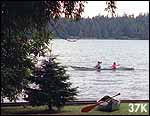


Pioneer's dream was destined to be made manifest
By DEBERA CARLTON HARRELL ![]()
SEATTLE POST-INTELLIGENCER REPORTER
City Manager Rich Conrad said Mercer Island is 90 percent built-out and is expected to hit 100 percent density by 2020, according to its comprehensive plan.
One of the reasons parking is virtually non-existent -- even at pleasant public amenities such as the trail-laden Pioneer Park and serene Ellis Pond -- is because land is simply too scarce and expensive to pave it over, Conrad said.
So much for the turn-of-the-century Duwamish Indian legend that an evil spirit lived on the island.
The truth about the island's beauty has been out since the 1880s, when early settler C.C. Calkins platted the town of "East Seattle" on Mercer Island's northwest shore. According to Judy Gellatly's book, "Mercer Island Heritage," the visionary Calkins built a magnificent three-story resort hotel featuring a ballroom, "storybook towers," verandas, Turkish baths and electricity on what is now a public access site south of the Interstate 90 bridge. Visitors shuttled across Lake Washington by steamer, as did U.S. President Benjamin Harrison on an 1891 visit to the Calkins Hotel.
But two years later, the depression of 1893 hit, followed by the deaths of Calkins' two children and his wife. Devastated, the man who promoted gracious living on the island "left the area for an unknown destination, never to return," Gellatly writes. The hotel later burned to the ground.
Calkins' dream of gracious living has endured. Mercer Island lies between two of the biggest cities in the Northwest, but remains a rural, residential refuge with a low crime rate, attractive buildings, numerous parks and protected wetlands.
Children of all ages attend sports and arts programs and long-time local festivals such as Circus McGurkus. King County's Mary Wayte pool near the high school draws 500 people a day in the spring.
The country clubs (swimming, tennis) have waiting lists, yet nowhere on Mercer Island is there a golf course because of continued resistance by environmentally fierce locals.
 Walk or drive around Mercer Island and you see tree-shaded lanes, equestrians riding on woodsy trails, children clambering atop playground toys, shrieking with glee. In the evening, people take walks or jog, unleash their dogs at Luther Burbank Regional Park, or fish for trout off the park dock.
Walk or drive around Mercer Island and you see tree-shaded lanes, equestrians riding on woodsy trails, children clambering atop playground toys, shrieking with glee. In the evening, people take walks or jog, unleash their dogs at Luther Burbank Regional Park, or fish for trout off the park dock.
"The first thing Mercer Islanders think about their community is that it's a special place," Conrad said. "And they're doggedly determined to preserve it as a special place."
Although there are some plans to develop more multifamily housing at the island's north end, the city's mandate is to keep the island a single-family residential area. There are an estimated 650 businesses on the island, but none involves industry or manufacturing.
The Town Center, revitalized in the past year with widened sidewalks, street lamps, flowers and more upscale shops and restaurants, has made Mercer Island seem even more small town, friendly and neighborly, residents say.
Milt Clampitt, whose Clampitt's Cleaners has been a community mainstay for 40 years, summed up the sentiments of his fellow islanders: "It is just a wonderful place to live."
Clampitt and others recall hardships, such as constant dust, rock-chipped windshields and traffic congestion endured during the 10 years of Interstate 90 construction. But noting their current six-minute commute to downtown Seattle and 15-minute drive to downtown Bellevue from north island, most say the inconvenience was well worth it.
Continued:
Community works hard for its privileged lifestyle
Affluent city starting to face hard questions

